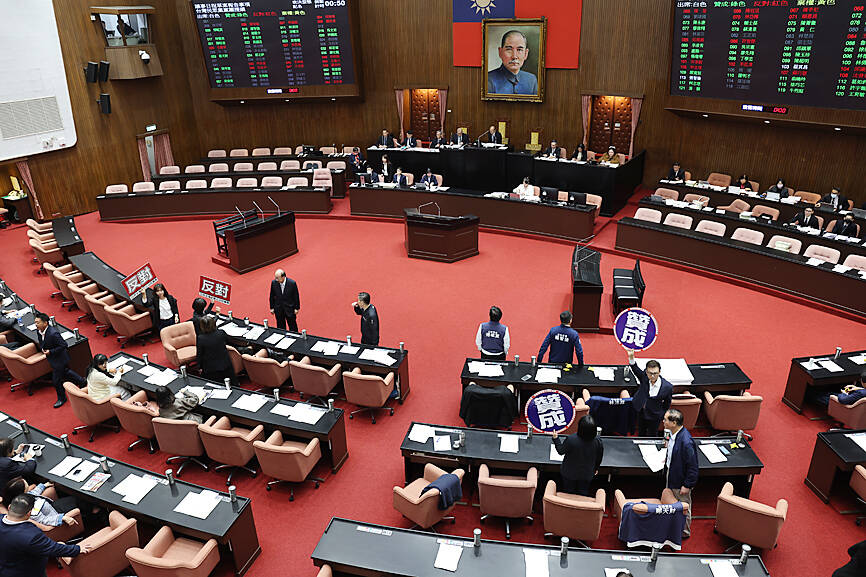The Legislative Yuan yesterday passed an amendment to the Referendum Act (公民投票法), stipulating that referendums and national elections would be held simultaneously if their time frames coincide.
Referendums were first coupled with national elections in 2017, but the legislature in June 2019 passed an amendment to the act to decouple referendums from elections. That amendment stipulated that referendums are to be held on the fourth Saturday of August once every two years, starting in 2021.
The new amendment states that referendums should be held within three to six months after a proposed referendum is officially announced, and that if there is a national election during that time, the two would be held on the same day.

Photo: CNA
The amendment also states that the day of the referendum voting should be a public holiday.
Democratic Progressive Party (DPP) Legislator Wu Ping-jui (吳秉叡) said Taiwanese in 2021 voted in a referendum that they did not want referendums coupled with national elections.
The opposition parties are ignoring public will and should shoulder all responsibility if their decision results in chaos during elections, he said.
Chinese Nationalist Party (KMT) caucus secretary-general Lo Chih-chiang (羅智強) said they were helping DPP founders realize their goal of coupling referendums with national elections, adding that the changes were a “lesson” for the modern-day DPP, which has betrayed the vision of its founders.
In related news, the legislature yesterday passed the third reading of amendments to the Local Government Act (地方制度法), reducing the nationwide cap on the number of deputy mayors. It would be implemented starting on Jan. 1 next year.
Current regulations state that special municipalities should have two deputy mayors, and if their population exceeds 2.5 million, the municipal government can appoint one additional deputy mayor. Meanwhile, counties and cities must have one deputy mayor or deputy commissioner, and if the population is more than 1.25 million, they can appoint an additional deputy.
The amended version yesterday removed the restrictions and states that special municipalities would, upon promulgation, have three deputy mayors, while counties and cities could appoint two deputy mayors and deputy commissioners.
It also changed the gender requirements to having one reserved seat for special municipality councilors, city or county councilors; or township representatives numbering three or above — down from one reserved seat for every four — and said one additional reserved seat should be made available for every three people in addition to the original three.
Councilors assuming office on or after Dec. 25, 2030, would benefit from the amendment.
DPP Secretary-General Chen Pei-yu (陳培瑜) said the amendments were tailor-made for Taipei Mayor Chiang Wan-an (蔣萬安), as Taipei’s population had dropped to 2.45 million as of July, and Taipei would not be able to appoint a replacement for incumbent Taipei Deputy Mayor Lee Si-chuan (李四川) should he resign to campaign for New Taipei City mayor next year.

MAKING WAVES: China’s maritime militia could become a nontraditional threat in war, clogging up shipping lanes to prevent US or Japanese intervention, a report said About 1,900 Chinese ships flying flags of convenience and fishing vessels that participated in China’s military exercises around Taiwan last month and in January have been listed for monitoring, Coast Guard Administration (CGA) Deputy Director-General Hsieh Ching-chin (謝慶欽) said yesterday. Following amendments to the Commercial Port Act (商港法) and the Law of Ships (船舶法) last month, the CGA can designate possible berthing areas or deny ports of call for vessels suspected of loitering around areas where undersea cables can be accessed, Oceans Affairs Council Minister Kuan Bi-ling (管碧玲) said. The list of suspected ships, originally 300, had risen to about 1,900 as

Japan’s strategic alliance with the US would collapse if Tokyo were to turn away from a conflict in Taiwan, Japanese Prime Minister Sanae Takaichi said yesterday, but distanced herself from previous comments that suggested a possible military response in such an event. Takaichi expressed her latest views on a nationally broadcast TV program late on Monday, where an opposition party leader criticized her for igniting tensions with China with the earlier remarks. Ties between Japan and China have sunk to the worst level in years after Takaichi said in November that a hypothetical Chinese attack on Taiwan could bring about a Japanese

The WHO ignored early COVID-19 warnings from Taiwan, US Deputy Secretary of Health and Human Services Jim O’Neill said on Friday, as part of justification for Washington withdrawing from the global health body. US Secretary of State Marco Rubio on Thursday said that the US was pulling out of the UN agency, as it failed to fulfill its responsibilities during the COVID-19 pandemic. The WHO “ignored early COVID warnings from Taiwan in 2019 by pretending Taiwan did not exist, O’Neill wrote on X on Friday, Taiwan time. “It ignored rigorous science and promoted lockdowns.” The US will “continue international coordination on infectious

DEEP-STRIKE CAPABILITY: The scenario simulated a PLA drill that turned into an assault on Taiwan’s critical infrastructure, with the launchers providing fire support Taiwan yesterday conducted this year’s first military exercises at Longsiang Base in Taichung, demonstrating the newly acquired High Mobility Artillery Rocket System’s (HIMARS) ability to provide fire support and deep-strike capabilities. The scenario simulated an attack on Penghu County, with HIMARS trucks immediately rolling into designated launch areas and firing barrages at the Wangan (望安) and Cimei (七美) islands, simulating the provision of fire support against invading forces. The HIMARS are supposed to “fire and leave,” which would significantly increase personnel and equipment survivability, a military official said. The drill simulated an exercise launched by the Chinese People’s Liberation Army (PLA) Eastern